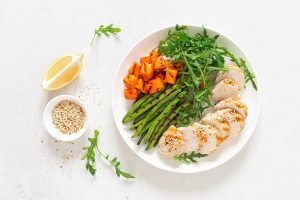 Eat lots of fruits and vegetables, whole grains, nuts and legumes, fish, lean proteins, exercise regularly, and limit sugar and salt. You’ve heard all the pillars of heart health before.
Eat lots of fruits and vegetables, whole grains, nuts and legumes, fish, lean proteins, exercise regularly, and limit sugar and salt. You’ve heard all the pillars of heart health before.
But what you eat is just part of the story. Many people mistakenly adopt habits that they think are good for their hearts. Instead, they may be making things worse.
Advertisement
Here are a few things you could unknowingly be doing to counteract your heart-healthy efforts.
You Completely Avoid Fat: Not all fats are created equal. Monounsaturated (MUFA) and polyunsaturated fatty acids (PUFA) can both help boost heart-healthy “good” HDL cholesterol and reduce “bad” LDL cholesterol.
These fatty acids also help you absorb fat-soluble vitamins A, D, E, and K.
You can replace unhealthy saturated fats in your diet with healthy ones by snacking on nuts and seeds, eating fish a couple of times per week, using olive oil for cooking, and putting avocado on your sandwiches.
You Completely Avoid Carbs: Carbohydrates, like fats, are not created equal. Popular low-carb diets like keto may help with weight loss, but eliminating an entire macronutrient group is never a good idea.
Carbs in fruits, vegetables, and whole grains are excellent sources of fiber and heart-healthy vitamins and minerals. Eating whole grains instead of refined grains is associated with a lower risk for heart disease and improved cholesterol, blood sugar, and inflammatory markers.
You Completely Avoid Salt: Too much salt, like too much sugar, is no good for your heart. The catch is that you still need salt.
Processed foods like pizza, white bread, and frozen food are loaded with salts and are what lead to the over-consumption of sodium. But if you’re making fresh food at home, go ahead and season your meals with some table salt.
Advertisement
Sodium, along with adequate potassium, helps regulate your heartbeat and blood pressure.
You Skip Meals: Skipping a meal means one thing: you’re going to be hungry later. And when that hunger hits, it is unlikely you’ll be reaching for carrot sticks or mixed nuts.
Skipping meals leads to more snacking on calorically dense high sugar and (bad) fatty foods. Stick to a meal and healthy snack schedule to keep energy and blood sugar where they should be to avoid the crash and scramble.
